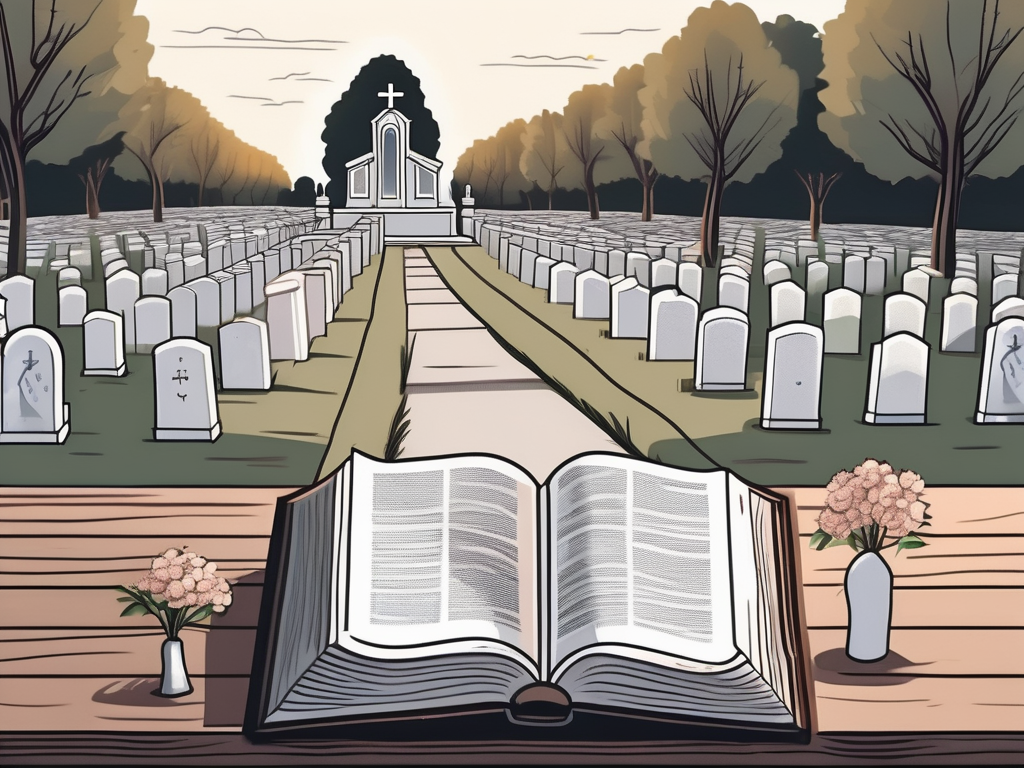In times of loss and grief, many people find comfort in the belief that their deceased loved ones continue to visit them from beyond the grave. But what does the Bible say about this phenomenon? Let’s explore the concept of afterlife in the Bible, biblical references to loved ones visiting after death, theological perspectives on after-death visits, the role of faith in the grieving process, and debunking misconceptions about after-death visits.
Understanding the Concept of Afterlife in the Bible
Death and what comes after it have been subjects of fascination and speculation throughout human history. In the Bible, we find various interpretations of death and the afterlife. These interpretations differ between the Old and New Testaments, shedding light on how different generations understood the mysteries of life and death.
According to biblical teachings, death is not considered the end of existence but rather a transition to another realm. The afterlife is depicted as a place where souls are reunited with God and granted eternal life.
In the Old Testament, the concept of the afterlife is not explicitly mentioned. Instead, the focus is on the present life and the relationship between God and His people. The Israelites believed in Sheol, a shadowy underworld where all souls, regardless of their moral standing, would reside after death. It was a place of rest and separation from the living world.
However, in the New Testament, with the arrival of Jesus Christ, the concept of the afterlife becomes more prominent. Jesus taught about the resurrection of the dead and the promise of eternal life for those who believe in Him. He spoke of a heavenly kingdom where believers would be in the presence of God forever.
Biblical Interpretations of Death and Afterlife
The concept of the afterlife in the Bible is often portrayed symbolically rather than providing specific details about the experiences of departed souls. It emphasizes the spiritual nature of existence beyond death. While the Bible does not explicitly address whether loved ones can visit us from beyond, it does provide insight into the Christian perspective on eternal life.
One interpretation of the afterlife is the idea of a judgment day, where all souls will be held accountable for their actions in life. This concept is found in both the Old and New Testaments. It suggests that there will be a separation between the righteous and the wicked, with the righteous being rewarded with eternal life in the presence of God, and the wicked facing punishment or eternal separation from God.
Another interpretation is the concept of heaven and hell. Heaven is described as a place of joy, peace, and eternal communion with God. It is portrayed as a realm of perfection and fulfillment. On the other hand, hell is depicted as a place of torment and separation from God. It is a realm of suffering and eternal punishment for those who reject God’s love and salvation.
The Christian Belief in Eternal Life
Christianity teaches that believers will experience eternal life after death. This belief is rooted in the teachings of Jesus Christ, who proclaimed that those who believe in Him will have everlasting life. As Christians, we trust in God’s promise of eternal salvation and hope to be reunited with our loved ones in the presence of God.
The Christian understanding of eternal life goes beyond a mere continuation of existence. It is a state of complete fulfillment, where believers will experience the fullness of God’s love and presence. It is a life free from pain, suffering, and the limitations of the earthly realm.
While the details of the afterlife remain mysterious, the Bible provides a foundation of hope and assurance for believers. It encourages us to live in faith and trust in God’s plan for our eternal destiny. The concept of the afterlife in the Bible invites us to ponder the mysteries of life and death, and to find comfort in the promise of eternal life with our Creator.
Biblical References to Loved Ones Visiting After Death
Although the Bible does not explicitly mention loved ones visiting us after death, various passages can be interpreted as providing glimpses into the possibility of such encounters. These references are scattered throughout both the Old and New Testaments, warranting a deeper exploration.
When delving into the Old Testament, we find accounts of spiritual experiences and interactions with the departed that offer profound insights. These encounters often serve as sources of comfort and guidance for the living, highlighting the interconnectedness between the physical and spiritual realms. One notable example can be found in 1 Samuel 28, where the spirit of the deceased prophet Samuel is summoned by King Saul through a medium. This extraordinary event not only acknowledges the existence of a spiritual realm beyond the physical, but also raises intriguing questions about the potential for communication between the living and the departed.
Furthermore, the Old Testament provides additional instances where individuals experience encounters with the departed. In the book of Job, Job himself expresses a longing for a reunion with his loved ones after death, stating, “If only you would hide me in the grave and conceal me till your anger has passed! If only you would set me a time and then remember me! If someone dies, will they live again? All the days of my hard service I will wait for my renewal to come” (Job 14:13-14). This heartfelt plea reflects the universal human desire for connection with departed loved ones, hinting at the possibility of such reunions beyond the earthly realm.
New Testament References
In the New Testament, we encounter instances where Jesus Himself interacts with departed individuals, shedding further light on the concept of life beyond death. One remarkable event is the Transfiguration, where Jesus appears alongside Moses and Elijah in the presence of Peter, James, and John. This extraordinary manifestation not only affirms the continuity of life after death, but also suggests the existence of a realm where departed souls can commune with the living. The Transfiguration serves as a powerful testament to the interconnectedness between the physical and spiritual dimensions, offering hope and reassurance to believers.
Additionally, the book of Acts provides another intriguing reference to encounters with departed individuals. In Acts 12:1-17, we read about Peter’s vision of the deceased Apostle, James. This vision occurs while Peter is imprisoned, and James appears to him, providing comfort and guidance. This extraordinary encounter not only demonstrates the existence of a spiritual realm that transcends earthly life, but also highlights the potential for departed loved ones to offer support and assistance to those who remain on earth.
While the Bible may not explicitly detail loved ones visiting us after death, the scattered references throughout both the Old and New Testaments offer glimpses into the possibility of such encounters. These passages provide a foundation for believers to explore and contemplate the profound mysteries of the afterlife, igniting hope and comfort in the face of loss and grief. The existence of a spiritual realm beyond the physical opens up a realm of possibilities, reminding us that the bonds we share with our loved ones may transcend the boundaries of life and death.
Theological Perspectives on After-Death Visits
Different Christian denominations hold varied views regarding loved ones visiting after death. While the Bible does not provide explicit details on this matter, theologians and scholars offer different interpretations based on their understanding of biblical teachings.
One perspective on after-death visits comes from Christian denominations that view these encounters as possible and meaningful. These denominations emphasize the spiritual connection between the living and the departed, believing that the bond between loved ones transcends physical death. They argue that after-death visits can serve as sources of comfort and guidance for those left behind. These encounters are seen as opportunities for the departed to provide reassurance, offer wisdom, or even deliver messages from the divine.
On the other hand, some Christian denominations adopt more skeptical stances when it comes to after-death visits. They approach these experiences with caution, considering them to be subjective or potentially misleading. Skeptics argue that the human mind is susceptible to illusions, hallucinations, and wishful thinking, which may lead individuals to believe they have encountered their deceased loved ones. They caution against attributing too much significance to these encounters, urging believers to focus on the teachings of the Bible rather than personal experiences.
Scholarly Opinions on After-Death Visits
When it comes to scholarly opinions on after-death visits, there is a wide range of perspectives. Some scholars argue that these experiences can be explained by psychological and emotional processes rather than literal encounters with the deceased. They suggest that grief, longing, and a strong desire to reconnect with loved ones can manifest in the form of vivid dreams, hallucinations, or even illusions. These experiences, while deeply personal and meaningful to the individuals involved, may not necessarily point to an objective reality beyond the realm of the mind.
On the other hand, other scholars propose that after-death visits occur in a spiritual realm that exists beyond our understanding. They argue that these encounters are not mere figments of imagination or psychological phenomena, but rather glimpses into a supernatural reality. According to this perspective, the departed souls may be granted the ability to communicate with the living, offering guidance, comfort, or closure. These scholars draw upon religious and metaphysical concepts to support their belief in the existence of a spiritual realm where such interactions can take place.
In conclusion, the theological perspectives on after-death visits are diverse and multifaceted. While some Christian denominations embrace the possibility of these encounters as meaningful connections between the living and the departed, others approach them with skepticism. Similarly, scholars offer different explanations, ranging from psychological processes to the existence of a spiritual realm. The debate surrounding after-death visits continues to stimulate theological and scholarly discussions, inviting individuals to explore their own beliefs and interpretations.
Comfort and Healing Through Spiritual Experiences
Regardless of differing opinions, many individuals find comfort and healing through spiritual experiences, including the belief in loved ones visiting after death. Such encounters can provide solace in times of grief and help individuals navigate the challenges of loss.
The Role of Faith in the Grieving Process
For those who believe in loved ones visiting after death, faith plays a significant role in the grieving process. It offers assurance that their departed loved ones are watching over them and continue to be a part of their lives in a spiritual sense. This belief can provide comfort and strength during the difficult journey of mourning.
Biblical Guidance for Coping with Loss
The Bible offers guidance on how to cope with loss and find solace in times of grief. It encourages individuals to lean on their faith, seek support from the community of believers, and trust in God’s plan. Scriptures such as Psalm 34:18 remind us that God is near to the brokenhearted and that He will comfort those who mourn.
Debunking Misconceptions About After-Death Visits
Despite the belief in after-death visits, numerous misconceptions and superstitions surround this topic. It is essential to address these misconceptions and approach the subject with biblical discernment.
Common Misinterpretations of Biblical Texts
One common misconception is the misinterpretation of biblical texts to support the idea of frequent visitations from departed loved ones. It is crucial to approach the Bible with careful study and understanding, avoiding cherry-picking verses that may lead to misunderstandings.
Addressing Superstitions and Folklore
Many cultural superstitions and folklore perpetuate the belief in frequent communication with the deceased. It is important to distinguish between biblical truth and traditional beliefs that may not align with scriptural teachings. By grounding our beliefs in the Bible, we can avoid falling into erroneous interpretations or relying on folklore.
In conclusion, while the Bible does not directly address the concept of loved ones visiting us after death, it provides insights into the afterlife and the Christian belief in eternal life. The interpretation of these teachings varies among Christian denominations and scholars, leading to different perspectives on the possibility of after-death visits. However, many individuals find comfort and healing through the belief in spiritual experiences, and the Bible offers guidance for coping with loss. It is essential to approach this topic with discernment and rely on the biblical teachings to address misconceptions and superstitions surrounding after-death visits.












